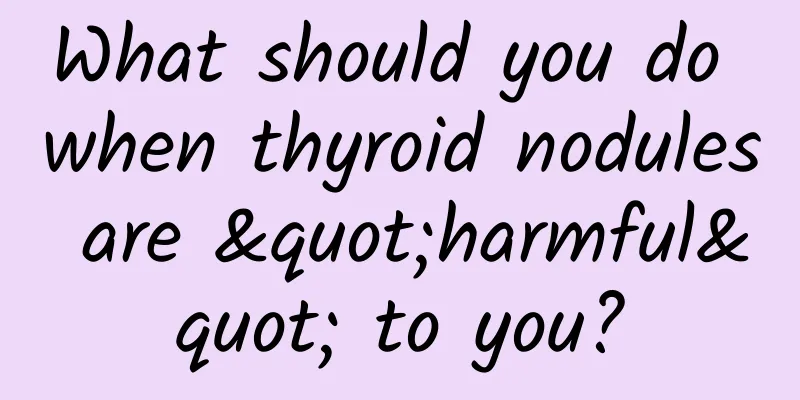What should you do when thyroid nodules are "harmful" to you?

|
Author: Yang Xiaorong Shanghai Pudong New Area Zhoupu Hospital Illustration: Ma Hong, Zhoupu Hospital, Pudong New Area, Shanghai Reviewer: Zhang Jinan, Chief Physician, Zhoupu Hospital, Pudong New Area, Shanghai In this age of "cancer fear", when thyroid nodules "have bad intentions" towards you, will you be frightened? Afraid that thyroid cancer will quickly take your life? In fact, excessive fear comes from your ignorance of the enemy. With the improvement of people's health awareness and the popularization of health examinations, the detection rate of thyroid nodules has increased year by year, even as high as 50% to 60%! In other words, more than 1/2 of the healthy population has thyroid nodules, of which 5% are malignant, mostly papillary carcinoma. Today we will talk about what we should do when we encounter "bad" thyroid nodules. Figure 1 Copyright image, no permission to reprint The first question: Which thyroid ultrasound report results should be taken seriously? When the ultrasound report has the following description, the risk of suspected malignancy reaches 70% to 90%, which should be taken seriously. (1) Solid hypoechoic or cystic-solid nodules in which the solid component is hypoechoic. (2) Simultaneous presence of one or more of the following ultrasound features: ① irregular margins (infiltrative, small lobes, or spiculated); ② microcalcifications; ③ aspect ratio > 1; ④ interrupted calcification at the margins, with low echoes protruding outside the calcifications; and ⑤ invasion of the thyroid capsule. If the above description is present, the thyroid nodule is generally considered to be malignant. At this time, the ultrasound physician will recommend that the patient complete a thyroid fine needle biopsy to further clarify the diagnosis. Figure 2 Copyright image, no permission to reprint The second question: What is “thyroid fine needle aspiration biopsy” and what are its indications? Ultrasound-guided thyroid fine needle aspiration biopsy is a minimally invasive procedure that involves extracting a small amount of tissue from a thyroid nodule through a fine needle. Anesthetic drugs are used during the procedure, and the patient feels almost no pain. It is the most sensitive and specific method for preoperative diagnosis of thyroid cancer. If the result is benign, surgery is not necessary; if the result indicates malignancy, it can help the clinician develop an appropriate surgical plan. The following situations require a fine needle aspiration biopsy of the thyroid gland. (1) Thyroid nodules with a diameter of less than 5 mm, when ultrasound indicates "high-risk thyroid lesions with the presence of pathological lymph nodes or growth outside the thyroid gland". When the diameter of the thyroid nodule is greater than 10 mm and the clinical manifestations cannot be determined as a benign lesion. Nodules with a diameter ≥ 20 mm show spongiosis, homogeneous high-intensity echoes, or a cystic nodule area of > 50%, or are progressively enlarged. Patients with a history of thyroid cancer or family history, or with suspicious clinical and imaging manifestations. Figure 3 Copyright image, no permission to reprint The third question: Under what circumstances is surgical intervention required? If a biopsy confirms the diagnosis of thyroid cancer, further treatment is needed. Surgery is the first choice for thyroid cancer. Figure 4 Copyright image, no permission to reprint The surgeon will develop an operation plan based on the nature of the tumor and perform total or partial lobectomy of the thyroid gland. Papillary thyroid cancer is the most common type of thyroid cancer, and the patient has a good prognosis after surgery, with a very low tumor recurrence rate. Situations in which total thyroidectomy is required : history of head and neck radiation exposure or exposure to radioactive dust in childhood, primary tumor with a maximum diameter greater than 4 cm, multiple cancer lesions, high-risk pathological subtype, distant tumor metastasis and bilateral cervical lymph node metastasis, and invasion of the trachea, esophagus, carotid artery, or mediastinum. Situations in which local thyroidectomy is required : no history of radiation exposure to the head and neck or exposure to radioactive dust in childhood, primary tumor ≤1 cm in maximum diameter, unilateral intraglandular or single tumor, low-risk pathological subtype, no cervical lymph node metastasis or distant metastasis. Some patients with papillary thyroid carcinoma also need to undergo central lymph node dissection on the same side of the lesion. Question 4: What is radiofrequency ablation? Which patients can undergo radiofrequency ablation? Some patients are very reluctant to have surgery, as they are worried that scars will be left on their necks and affect their appearance. So, are there any other ways to treat it? Radiofrequency ablation is to implant ablation electrodes into the lesion under ultrasound guidance, and to increase the temperature in the tissue to cause tissue necrosis, thereby achieving the purpose of inactivating the lesion in situ. Ultrasound-guided thermal ablation is a relatively new treatment method with the advantages of less trauma, faster recovery, and fewer complications. It can be used to treat benign thyroid nodules, low-risk thyroid microcancers, and metastatic lymph nodes in the neck. For those who have contraindications to surgery or are unwilling to undergo surgery, radiofrequency ablation is a good choice, but whether thyroid cancer patients can use this emerging method still needs to be evaluated and judged by surgeons. Figure 5 Copyright image, no permission to reprint The fifth question: Do patients with thyroid cancer need to take levothyroxine sodium tablets (Euthyrox) after surgery? How should patients be followed up after surgery? After total thyroidectomy, patients need to take adequate amounts of levothyroxine sodium tablets for life and have their thyroid function checked monthly to adjust the drug dosage; at the same time, TSH needs to be kept suppressed to reduce the risk of tumor recurrence and metastasis. For patients who undergo local thyroidectomy or radiofrequency ablation, if there is no abnormality in thyroid function after postoperative follow-up, they do not need to take levothyroxine sodium tablets. They only need to follow up with regular thyroid ultrasound. |
<<: Young stroke, how far are we from it?
>>: Obesity is a problem that troubles many young people. Do you know how to manage it with “TLC”?
Recommend
Causes of white spots on the vaginal opening
If white spots suddenly appear at the vaginal ope...
Why is the vaginal discharge yellow-green?
Normal leucorrhea should be colorless and odorles...
What to do if your belly is still big after giving birth
During pregnancy, in order to ensure that the fet...
What is the effect of cosmetic face-lift injections?
Many people want to have big eyes and a pointed c...
Can pregnant women eat motherwort?
Some female friends asked me when they were pregn...
How to treat pruritus during pregnancy
Pruritus gravidarum is a common symptom among wom...
I have bloating and pain during my period and can't walk
If women have bloating, stomach pain, or even can...
Can papaya and kudzu root powder really enlarge breasts?
Pueraria root is a common Chinese medicine, and p...
What are the symptoms of depression in women
With the increasingly fast pace of life today, mo...
Verification of pregnancy and birth of a boy after ovulation
A family hopes for the birth of a smart baby. If ...
Can I eat bayberry during late pregnancy?
Everyone should know or have eaten the fruit bayb...
One month pregnant, my belly is always swollen
Many women believe that there are very few physic...
Peking Union Medical College doctors say | Advanced age, test tube, fibroids, hypothyroidism... Peking Union Medical College doctors help pregnant mothers overcome all difficulties
Xiao A, a 40-year-old primipara, had intussuscept...
I felt my vision was distorted and space was twisted. The doctor said I had walked into Alice in Wonderland.
Still from Svankmajer's Alice (1988). © Cogni...
What is the differential diagnosis of pelvic tuberculosis?
Pelvic tuberculosis is very harmful to patients a...









